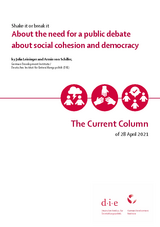Shake it or break it
About the need for a public debate about social cohesion and democracy
Leininger, Julia / Armin von SchillerThe Current Column (2021)
German Development Institute / Deutsches Institut für Entwicklungspolitik (DIE), The Current Column of 28 April 2021
Societies in the Global North are not used to coping with the exceptional uncertainties they have been facing during recent years. After a sustained period of prosperity in the 1990s and early 2000s, dynamics emerging from instances such as the global economic crisis, the “migration wave” in 2015 or the ongoing COVID-19 pandemic are leaving behind profound societal marks. Precisely in such times of stress, societal consensus around what holds societies together, how we interact with each other and solve discrepancies is particularly relevant.
Against what many “preached” at the beginning of the COVID-19 pandemic, societies did not become stronger through the crisis. In fact, evidence shows that the backbone of our open societies erodes and is at risk. A recent study finds that social cohesion in Germany remained high on average throughout the pandemic but specific social groups (less educated and lower income groups) drift apart. Values like political equality and human dignity that we assumed to be deeply ingrained in our society are now openly questioned in the public discourse.
One core societal challenge we face in open societies is the need to clearly name and debate the weaknesses and inconsistencies that have become apparent during these years. We consider this discussion essential to preserve inclusive, open and democratic systems and strengthen core values afresh. Two topics are key in this regard: social cohesion and democracy.
Social Cohesion and democracy are foundations of common good-oriented societies
Social cohesion is not only decisive for dealing with crises but also represents an important tenet of peace and prosperity. A strong bond between members of society is associated with better quality of life, economic growth and health. Social cohesion constitutes the basis for negotiating interests and shared values. Where people and the state maintain a trustful and constructive relationship, agreement on what are common goods and cooperation for achieving them often is easier.
Democracies do not only provide immense socio-economic and security benefits but are the only systems, which tolerate diversity and moderate diverging opinions through inclusive institutions. Openness, participation and rule of law create space for debates on common goods and shared values, which, in turn, can foster social cohesion.
Unfortunately, social cohesion and democratic institutions are suffering around the globe. Take democracy: The accelerated “third wave of autocratisation” is leading to the fact that one-third of the world’s population – 2.6 billion people – now lives in autocratising countries. On social cohesion, numbers are only marginally available and less precise. The German Development Institute / Deutsches Institut für Entwicklungspolitik (DIE) is working on closing this. But all evidence points in the same negative direction. These developments are extremely worrisome as they erode the bases of our value systems. Open societies are responsible to act now.
More than nice to have: Democracy and social cohesion on the political agenda
Social Cohesion and democracy are not something that does exist by default. They need to be cultivated, fostered and protected. Erosion of social cohesion and democratic decay are not only a matter of concern in the Global North but around the globe. Just like the global pandemic, protecting and nurturing democracy and social cohesion require international action. Governments and international organisations are aware of this necessity and have recently launched new initiatives in this direction. German development cooperation, too, has defined social cohesion as one of its strategic goals for the future.
These are positive developments but we can go further. Democracy and social cohesion are more than nice to have and rightly deserve a place on top of international agendas. They should be guiding principles for action. Furthermore, holding a continuous political dialogue about democracy and social cohesion in different contexts and with all partners is a fantastic opportunity to rethink development policy and practice. The open (potentially critical) exchange of ideas and visions on these concepts can facilitate a transformation of international cooperation by creating a culture of mutual dialogue and co-creation instead of the paradigm of knowledge floating from the Global North to the Global South.
The erosion of the foundational basis of our societies also deserves a prominent position in the public debate in Germany. The current run-up to the parliamentary elections represents a perfect opportunity for our politicians and our society at large to critically and honestly discuss our understandings of social cohesion and democracy as well as about how we want to foster them at the national and international level. Cynical and one-sided media campaigns like #allesdichtmachen might rather deepen our divides than foster critical dialogue. We need a productive debate between diverging viewpoints. If guided by respect for each other’s viewpoints and the willingness to revise one’s own standpoint, those who thought that the pandemic makes us hold together better might still become right. As a knowledge-creating and policy-oriented research institute, DIE is an enthusiastic partner to support any honest dialogue in this area and share its expertise and ideas.



